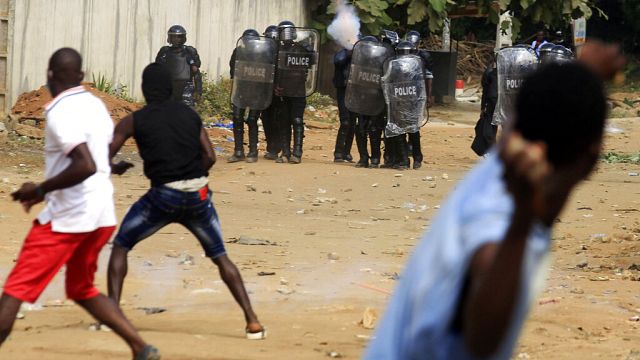In the bustling city of Bouaké, Ivory Coast, a routine search at the local prison took a deadly turn, leaving five inmates dead and several others injured. What started as a standard procedure to uncover contraband swiftly escalated into a violent clash that shocked both prison authorities and the local community.
Prisoners, seemingly caught off guard by the search, responded with what authorities described as “hostility.” Armed with makeshift weapons like clubs and machetes, they launched a fierce attack on the security officers conducting the operation. In the chaos that ensued, five inmates lost their lives, while 29 individuals, including both prison staff and detainees, suffered injuries of varying degrees.
The scene painted a grim picture of desperation and defiance within the prison walls. Security officers, faced with an unexpected onslaught, resorted to firing warning shots to protect themselves and retreat from the volatile situation. The exact circumstances leading to the prisoners’ deaths remained shrouded in uncertainty, adding to the gravity of the incident.
As authorities grappled with the aftermath of the tragic clash, the discovery of contraband items such as cannabis, Tramadol tablets, mobile phones, and even grenades underscored the challenges of maintaining order and security within Ivory Coast’s prison system.
This disturbing episode in Bouaké is not an isolated incident but rather a symptom of deeper-rooted issues plaguing the country’s correctional facilities. Human rights organizations and international bodies, including the United Nations, have long criticized Ivory Coast for its substandard prison conditions. Reports of overcrowding, poor sanitation, and inadequate provisions for detainees have raised alarms about the state of the penal system.
The UN Committee Against Torture, in particular, voiced concerns over the alarming rate of overcrowding in Ivorian prisons, highlighting the deplorable living conditions that many inmates endure on a daily basis. Hygiene deficiencies, lack of proper ventilation, and insufficient access to basic necessities like food and water have further compounded the challenges faced by both prisoners and prison authorities.
The prevalence of violence within the prison walls has emerged as a troubling trend, reflecting not only the harsh realities of incarceration but also the systemic issues that perpetuate unrest and conflict among detainees. Incidents like the recent clash at Bouaké prison serve as stark reminders of the volatile environment within which both inmates and staff operate, highlighting the urgent need for comprehensive reforms and enhanced security measures.
Earlier this year, the death of a prisoner during an escape attempt from the same facility underscored the inherent risks and vulnerabilities present in Ivory Coast’s prison system. The public prosecutor’s office wasted no time in launching an investigation into the events that transpired on that fateful Tuesday, signaling a commitment to uncover the truth and address the underlying issues that culminated in tragedy.
As stakeholders reflect on the implications of this latest incident, questions arise about the efficacy of current prison management strategies and the broader implications for the criminal justice system in Ivory Coast. The need for proactive measures to improve detention conditions, enhance security protocols, and promote rehabilitation and reintegration efforts becomes increasingly apparent in the wake of such a devastating event.
The clash at Bouaké prison serves as a poignant reminder of the complexities and challenges inherent in the realm of corrections and highlights the critical importance of addressing systemic deficiencies to ensure the safety and well-being of both inmates and prison staff. As Ivory Coast grapples with the aftermath of this tragic event, it stands at a crossroads, poised to embark on a path of reform and transformation that can redefine the future of its penal system.

